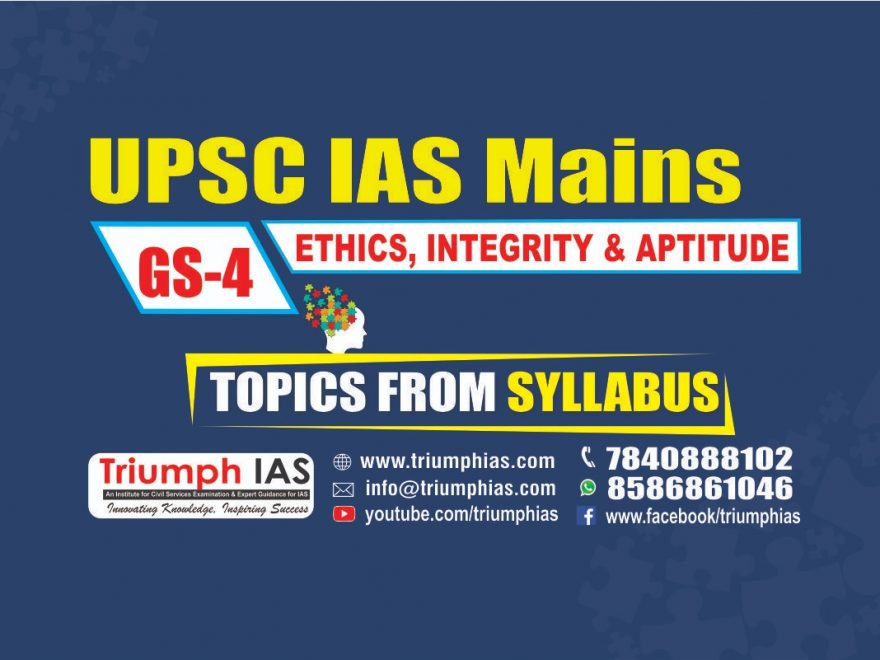Relevance: Mains: G.S paper IV: Ethics Born on 2 October, 1869, Gandhi incorporated a non-violent resistance, taking the forefront of
Continue reading
General Studies- IV: Ethics, Integrity and Aptitude
Ethics and Human Interface: Essence, determinants and consequences of Ethics in-human actions; dimensions of ethics; ethics – in private and public relationships. Human Values – lessons from the lives and teachings of great leaders, reformers and administrators; role of family society and educational institutions in inculcating values.
Attitude: content, structure, function; its influence and relation with thought and behaviour; moral and political attitudes; social influence and persuasion.
Aptitude and foundational values for Civil Service, integrity, impartiality and non-partisanship, objectivity, dedication to public service, empathy, tolerance and compassion towards the weaker-sections.
Emotional intelligence-concepts, and their utilities and application in administration and governance.
Contributions of moral thinkers and philosophers from India and world.
Public/Civil service values and Ethics in Public administration: Status and problems; ethical concerns and dilemmas in government and private institutions; laws, rules, regulations and conscience as sources of ethical guidance; accountability and ethical governance; strengthening of ethical and moral values in governance; ethical issues in international relations and funding; corporate governance.
Probity in Governance: Concept of public service; Philosophical basis of governance and probity; Information sharing and transparency in government, Right to Information, Codes of Ethics, Codes of Conduct, Citizen’s Charters, Work culture, Quality of service delivery, Utilization of public funds, challenges of corruption.
Case Studies on above issues.

Relevance: Mains: G.S paper IV: Ethics Born on 2 October, 1869, Gandhi incorporated a non-violent resistance, taking the forefront of
Continue reading
What are the basic principles of public life? Illustrate any three of these with suitable examples. (150 words)10 Approach: First
Continue reading
CODE OF CONDUCT IS A QUICK-FIX STRATEGY AND IS FORCIBLE. IT REDUCES ETHICS TO LEGALITY BY DIRECTING ON BOTH THE
Continue reading
Relevance: Mains: G.S paper IV: Ethics Citizen Charter is based on the promise that Citizen is “King” and government organisations
Continue reading
Relevance: Mains: Paper IV: Ethics: lives and teachings of great leaders, reformers and administrators; role of family, society The people who
Continue reading
Relevance: Mains: G.S paper IV: Ethics Civil services represent a very important tool to establish an equitable society through which
Continue reading
Relevance: mains: G.S paper IV: Ethics Context Whistle-blowing is a critical aspect that helps in upholding corporate ethics. In recent
Continue reading
Relevance: mains: G.S paper IV: Ethics Everyone knows the central ontological question: “Why there is being, being rather than nothing?
Continue reading
Relevance: mains: G.S paper IV: Ethics The key difference between Ethics and Values is that while ethics is a branch
Continue reading
Relevance: mains: G.S paper IV: Ethics: Citizen’s Charter Sevottam Model is proposed by 2nd ARC (Administrative Reforms Commission) for public Service
Continue reading
Crisis of Conscience : Ethical Decision Making (Relevant For Mains G.S paper IV) What is meant by Conscience? Conscience is
Continue reading
Relevance: mains: G.S paper IV: Emotional Intelligence Context Wiping out market-creation losses typically involves reducing customer subsidies bit by bit
Continue reading
Euthanasia (“good death”) is the practice of intentionally ending a life in order to relieve pain and suffering. It is
Continue reading
Relevance: mains: G.S paper IV: Contributions of moral thinkers and philosophers from India and world. Abundant of ancient Greek moral theories
Continue reading
Relevance: mains: G.S paper IV: Ethics: Probity and Governance Smooth civil service assists to foster good policy making, effective service
Continue reading